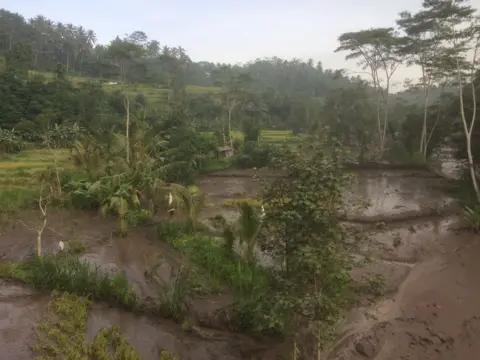Bali volcano: Non-evacuees may be forced to leave area
People who have not left their homes around a rumbling volcano in Bali may be forcibly evicted, Indonesian authorities have said.
Tens of thousands of people stayed put near Mount Agung after an alert was raised to its highest level.
Some still felt safe while others did not want to leave livestock.
A spokesman for the country's National Disaster Management Agency (BNPB) said people were checking the exclusion zone for non-evacuees.
"There are personnel doing the sweeping, if they [residents] need to be forcibly evacuated," Sutopo Purwo Nugroho said.
The closure of the island's airport was extended for a second day, leaving thousands stranded in the tourist hotspot.
Up to 100,000 people live in the area that could potentially be affected by streams of burning rock have been spotted flowing down from the mountain. But by Monday only 40,000 had left.
Mount Agung's volcanic tremors first began in September.
Since last week dark gas and ash have been billowing up to 3,400m (11,150ft) above the mountain's summit.
How close is it to a major eruption?
The BNPB raised the alert to level four from 06:00 local time (22:00 GMT on Sunday) because of an "imminent risk of disaster".
The volcano is emitting "continuous ash puffs" with occasional "explosive eruptions" that could be heard 12km (7 miles) from the summit.
"The rays of fire are increasingly observed at night. This indicates the potential for a larger eruption is imminent," it said in a statement (in Indonesian) on its Facebook page.

Geologist Mark Tingay of the University of Adelaide told the BBC that eruptions were difficult to predict and it was "very hard to tell" exactly how the situation would develop.
He added that Indonesian authorities appeared "extremely well prepared", with the situation "well under control".
How are locals coping?
Authorities have widened the exclusion zone to a 10km (six-mile) radius, and have ordered people in the area to evacuate.
Mr Sutopo said some people within the exclusion zone did not leave because the area was not touched during the last eruption, more than 50 years ago.

Others are concerned about their animals. Local man Komang Gede told AFP news agency: "We will try to go the evacuation centres in the afternoon, because in the morning we have to stay here to feed our livestock."
Lahars, also known as "cold lava", are slurries of rock fragments mixed with water, and have been spotted in fields and rivers near the volcano.
They are chiefly caused by pyroclastic flows - fast-moving flows of gas and ash that can reach temperatures of 800C (1470F).
 BBC Indonesia
BBC IndonesiaOfficials have been distributing masks for local residents, as ash rains down in the vicinity.
Anna Baranova, who works with non-governmental organisation Kopernik that is helping evacuees, told the BBC her group was trying to bring in better masks and distribute solar-powered TVs for informational purposes in case the electricity cuts out.
Authorities first issued warnings of an imminent eruption and raised the alert to the highest level two months ago, after detecting heightened volcanic activity.
Following mass evacuations, some islanders returned to their homes in October when the alert level was lowered with a decrease in activity.
According to official estimates, the holiday island lost at least $110m (£83m) in tourism and productivity during that major evacuation.
Should tourists be worried?
The main tourist stretch of Kuta and Seminyak is about 70km (43 miles) from the volcano, far beyond the exclusion zone.
But the ash prompted officials to shut down Bali's Ngurah Rai airport from Monday to Tuesday morning.
Airport authorities said 445 flights had been cancelled, affecting 59,000 travellers, while Indonesia's hotel association said stranded tourists staying at member hotels could stay one night for free.
The Australian government issued travel advice saying: "Volcanic activity may escalate with little or no notice."
The UK's Foreign Office have advised travellers to be prepared for cancelled flights, closely monitor local media, and to heed local authorities' warnings.

Are you in the area? Have your travel plans been affected? What are conditions like currently? If it is safe to do so, email haveyoursay@bbc.co.uk
You can also contact us in the following ways:
- Tweet: @BBC_HaveYourSay
- Send pictures/video to yourpics@bbc.co.uk
- Or Upload your pictures/video here
- WhatsApp: +44 7555 173285
- Text an SMS or MMS to 61124 (UK) or +44 7624 800 100 (international)
- Please read our terms & conditions
